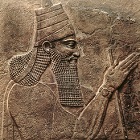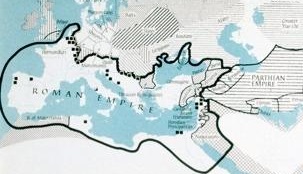|
3rd Intermediate Period / Arameans |  Phoenicia, Philistia, Aram Ammon, Moab, Edom |
Neo-Asyrian Empire

738 King Tiglath-Pileser III of Assyria invades Israel, forcing it to pay tribute.
• Amos traveled from Judah to warn King Jeroboam II of Israel of the injustice suffered by the poor and that worship of God required just and righteous behavior. Amos was expelled but continued preaching through his Book.
• Hosea was a prophet in the Kingdom of Israel during the reign of Jeroboam II. In his Book, he compares his unfaithful wife to Israel's unfaithfulness to the Lord.
•
 Micah, active from approximately 737 to 696, prophesied the destruction and then future restoration of the Judean state, and he rebuked the people of Judah for dishonesty and idolatry during the reigns of kings Jotham, Ahaz, and Hezekiah.
Micah, active from approximately 737 to 696, prophesied the destruction and then future restoration of the Judean state, and he rebuked the people of Judah for dishonesty and idolatry during the reigns of kings Jotham, Ahaz, and Hezekiah.•
 Isaiah prophesied to Hezekiah that the Assyrian army under Sennacherib had angered God and 185,000 of its men were killed in one night as they approached Jerusalem. The 2nd half of his Book is attributed to his disciples writing 100 and more years later.
Isaiah prophesied to Hezekiah that the Assyrian army under Sennacherib had angered God and 185,000 of its men were killed in one night as they approached Jerusalem. The 2nd half of his Book is attributed to his disciples writing 100 and more years later. 

664: Assyrians under Ashurbanipal conquered Egypt, sacking Memphis and Thebes. This is the largest expansion of the Neo-Assyrian Empire.
• Nahum wrote a Book about the downfall of Nineveh and the Assyrian Empire in 612.
• Zephaniah wrote about God's judgement of Jerusalem and neighboring kingdoms of the Philistines, Moabites, Ammonites, Ethiopians, and Assyrians as a prelude to a future worldwide Messianic Kingdom.
• Habakkuk wrote about the impending Babylonian conquest of Jerusalem and the inevitable triumph of faith in God in his Book.
•
 Jeremiah authored several Books in the Bible and prophesied the conquest of Judah and the Babylonian exile. c.650-c.570
Jeremiah authored several Books in the Bible and prophesied the conquest of Judah and the Babylonian exile. c.650-c.570• According to R. Friedman, author of Who Wrote the Bible?, the sacred texts of the surviving northern Israelites were combined with those of the Judeans in a revised Torah shortly before the fall of Assyria.
c.750-550
 Greeks colonized the Mediterranean and Black Sea coasts.
Greeks colonized the Mediterranean and Black Sea coasts. 
c.650 or 600 The first silver coins are minted in Lydia. Greeks spread the use of coins, staters and drachmas, around the Mediterranean.
Units of bronze similarly began to be traded in China around the same time.
Neo-Babylonian / Persian Empires
Persian Empire / Greek City States / Roman Republic
Macedonian / Persian Empire
399 Athenians attribute their defeats in Syracuse and Aegospotami to the impiety that the godless philoslpher Socrates (c.470–399) had instilled in the youth. After a trial that lasted a day, he was sentenced to death.
392 Unlike previous itenerant sophists, Isocrates (436–338) founded a shool of rhetoric in Lyceum of Athens which promoted a philosophy of public service.
c. 388 Plato founds the Academy at Athens.
c. 366 Aristotle joins Plato's Academy.
• Diogenes c,404-323 the Cynic fled Sinope to Athens, offended many, including Plato by proclaiming Antisthenes the true disciple of Socrates. Diogenes was later enslaved by pirates, settled in Corinth. where he passed his philosophy of Cynicism to Crates.
335 Aristotle founds the Peripatetic school in the Lyceum of Athens.

323: Alexander the Great dies at Babylon, of a fever.
c. 307 Epicurus founds the philosophy of Epicureanism
c. 300 Zeno of Citium, after studying Cynicism, Platonism and the dialectal method, founds the Stoic school of philosophy in Athens.
Macedonian Empires
• The "father of geometry", Euclid (c.300s-200s), compiled his teaching in his Elements treatise while living in Alexandria.
c. 260s Emperor Ashoka promotes Buddhism in India
c. 264 Arcesilaus becomes the head of the Academy at Athens and founds Academic Skepticism
c.262 Philosopher Cleanthes became head (scholarch) of the Stoic school in Athens. c.330-230 BC
c. 240 Eratosthenes calculates the circumference of the earth.
c. 229 Chrysippus succeeds Cleanthes as head of the Stoic school in Athens

218: Declaration of Second Punic Warr to 201 (Carthage vs.Rome)
217: Hannibal crosses Alps from Gaul into Italy.
212: Archimedes, the greatest inventor of antiquity, is killed while safeguarding a few scientific instruments, when Marcellus allows his Roman soldiers to loot the city of Syracuse.
Roman Conquest / Macedonian Empires
• Hellenistic Jewish scribe Ben Sira writes the Book of Sirach

169: Selucid King Antiochus IV Epiphanes captures Jerusalem.
167
 Beginning of Maccabean War of Liberation against Antiochus IV Epiphanes.
Beginning of Maccabean War of Liberation against Antiochus IV Epiphanes.164: Maccabeans recapture City of Jerusalem.
155 The New or Third Academy begins with Carneades, in 155
155 Carneades 213-128 gives lectures in Rome on Skepticism.
• Antiochus of Ascalon c.130–c.68 rejected skepticism and blended Stoic doctrines with Platonism as the first philosopher in the tradition of Middle Platonism.
• Hipparchus, the founder of trigonometry, discovers of the precession of the equinoxes.
• Babylonian and Egyptian Decan astrology are combined in Hellenistic Egypt to develop horoscopic astrology.
Roman Imperialism 88 The Greek Philo c.158–c.83 teaches Cicero in Rome.
79 Cicero studies philisophy in Athens with neo-platonist Antiochus of Ascalon.
44 In his philosophical dialogue about ancient Roman divination, De Divinatione, Cicero is the first to criticize astrology as a Pseudoscience.

27 the Roman Senate votes Octavian the title of Augustus. Augustus eventually assumes all authority formerly held by the Roman senate becoming the first emperor. This is traditionally taken as the end of the Roman Republic and the beginning of the Principate (27 BC-AD 235).
